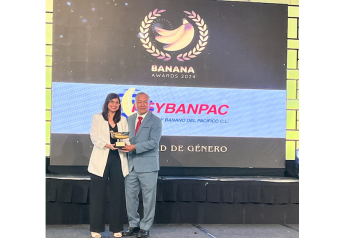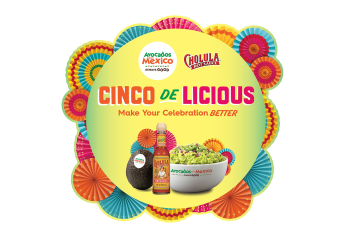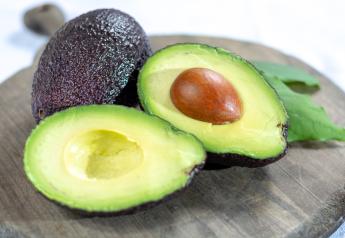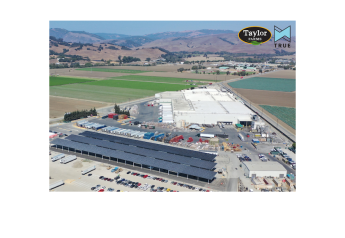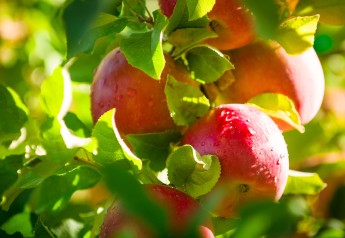Weather likely causing a smaller crop of Florida avocados this year
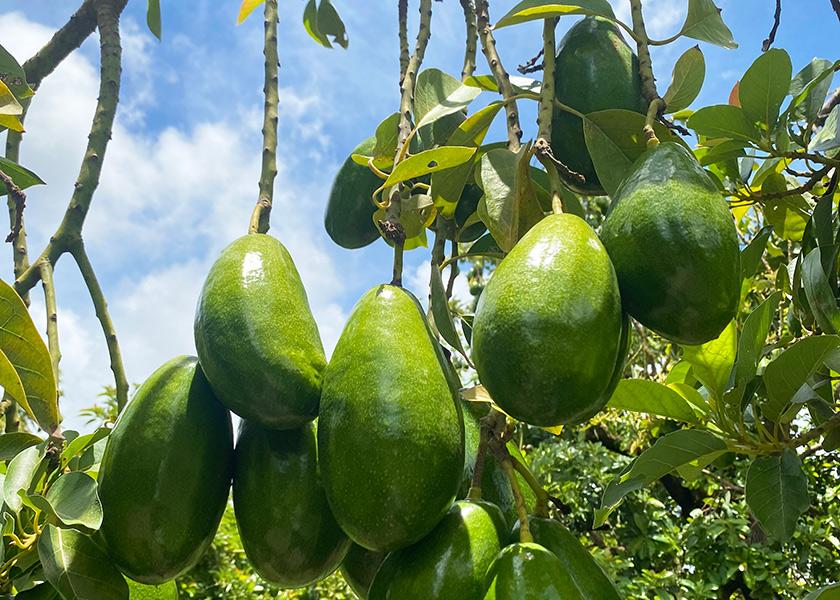
The outlook for Florida avocados for the 2023-24 season is good, says Anita Fernandez, manager of the Avocado Administrative Committee in Homestead, Fla.
The committee expects there to be around 600,000 bushels this year, up from last year when the committee estimated 500,000 bushels yet came in at closer to 644,000.
“The weather has had an impact,” said Fernandez, speaking to The Packer in mid-May. “We see a lot of bloom on the trees but not so much on the fruit, so we’re waiting for a lot of the varieties that usually bloom in late June to see where we stand.”
It’s likely, she said, that those varieties will bloom a week or two late in early July instead of late June.
There are around 300 avocado growers in Florida, a mix of small and large farms, Fernandez said, and most of them in the southern areas of the state.
A large grower is New Limeco in Princeton, Fla., which so far is expecting a smaller crop for some of the earlier varieties this year; that is disappointing after a heavy year for the 2022-2023 season.
“Some of the cold weather we had — with some nights in the low 30s in January, February and December — could have affected some of the flowering that was starting to come on, and that was a key moment,” said Eddie Caram, general manager. “Or sometimes the trees get too stressed in a heavy year and the next season tends to be lighter, but that’s not true for all varieties.”
Likewise for Brooks Tropicals in Homestead.
“The 2023 season appears to be slightly lower in volume than last year and is expected to begin a few weeks later,” said Peter Leifermann, vice president of sales and marketing.
So far New Limeco is seeing certain varieties down 10% to 15% or even 20%, especially the Donnie avocado, one of the many types grown in the state.
Along with the succession of cold nights in the winter, Caram pointed out that there’s not been a lot of rain this year, which has also affected crops.
“Even though we’re irrigating, it’s not the same. We’ve not had a dry, dry spell, though, which can also be bad,” he said.
Meanwhile, Leifermann said that “a few weeks of hot and windy weather may have affected pollination.”
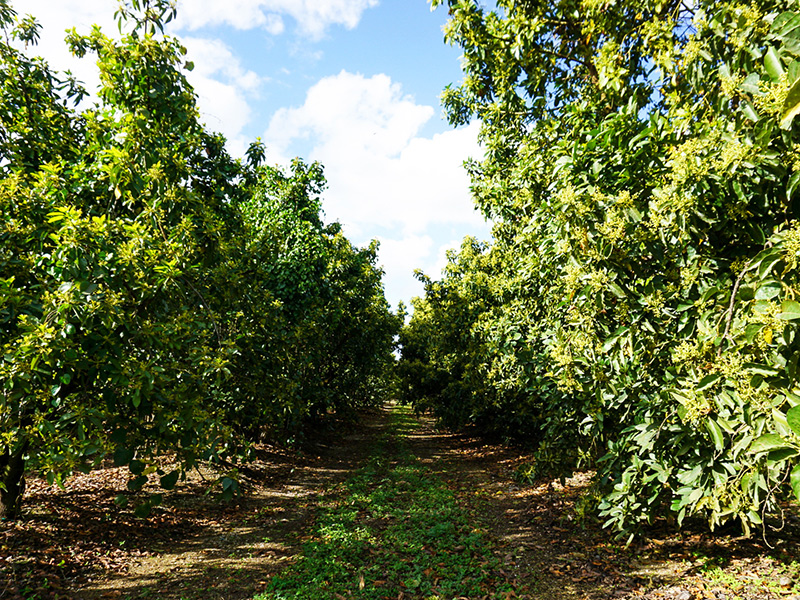
Florida differentials
Florida avocados are different than their hass cousins. They’re quite a bit larger and sometimes weigh a pound or more. They retain their green skin even when ripe — though sometimes have some brown mottling — and that skin’s usually pretty smooth.
There are at least 50 different varieties of Florida avocados, including the Donnie, the Lula, the Bernecker and the Pollock. They’re lower in fat than hass avocados, especially those from eastern Florida, which boast around 10 grams less fat than a standard hass avocado and about a third of the calories. The flesh is not as rich and creamy because of the lower fat content, but it holds up well when cubed.
“Their flavor and texture are quite different,” Fernandez said.
New Limeco used to grow around 45 varieties of avocado but now consistently has closer to 10.
“Some farms were sold, some varieties didn’t produce as well and some varieties were grafted into other varieties along the way,” Caram said.
Consumers have their favorites, he said, “and know when they’re coming into season.” The varieties are all available at different times of the year, providing an almost year-round crop from late May through late March.
“We used to have a gap from December but now, because of later varieties we’ve put in and grafting, we have them for nine to 10 months,” Caram said.
Related news: How one avocado supplier is using data to drive sustainable decision-making
3 Guys from Brooklyn, a specialty produce market in New York, carries Florida avocados when they’re available.
“If we’re going to stand out as a specialty store, we need to have good variety,” said managing partner Philip Penta.
This isn’t a huge category for the store, but when Penta can source them, he keeps them separate from hass avocados.
“We give them their own space,” he said, adding that they go in different locations. Recently he merchandised them next to sweet peppers and eggplants “because we like to mix up color and our vegetable section is so big.”
Some customers prefer avocados from Florida over hass, Penta said.
“We have a small subsection that enjoys these,” he said.
Publix, which is headquartered in Lakeland, Fla., offers Florida avocados, hass avocados and organic avocados. Though sales are always brisk, they peak for the Super Bowl and Cinco de Mayo, said Curt Epperson, business development director for produce and floral.
During peak times and throughout the year, the stores promote avocados through advertisements and in-store promotions in the lobby, on endcaps in the produce department, and through high-graphic bins and flex areas.
“Promotions are always accompanied with promotional signage,” said Epperson, adding that promos “are a great way to drive awareness and provide value to our customers.”
Cross-promotions also boost avocado sales.
“Avocados are a nutrient powerhouse and tie in nicely with many fresh items within our department for fresh guacamole. [They’re] also great for avocado toast and chips and dip. Our teams develop a promotional and merchandising strategy that meets our customers’ needs and provides quality and value,” Epperson said.
Related news: Building a one-stop avocado shop — Q&A with Frutura avocado whisperer Stephen Fink
Where do they go?
According to the Florida Department of Agriculture and Consumer Services in Tallahassee, more than 75% of exported Florida avocados are shipped to Canada. Other top export destinations include the Cayman Islands and the Bahamas.
Within the U.S., Brooks Tropicals ships avocados across North America, “and the SlimCado brand is recognized by clubs and retailers of all sizes throughout the industry as the standard-bearer,” Leifermann said.
New Limeco’s fruits are shipped across the country, though they tend to go mostly to the Southeast and Northeast. They go to wholesalers, retailers and a few to food service, Caram said.
Caram anticipates that prices for Florida avocados could be higher this year because of lighter production.
“Then add in the cost of cardboard packing material, diesel, employees and increases on everything across the board,” he said. “There should be an increase because of less volume and more demand.”
Marketing and promotions
New Limeco tries to work with retailers to provide seasonal programs and information, largely helping them with advertisements in their store newspaper “so they can sell larger volumes or offer specials,” Caram said.
The company also allows retailers to piggyback onto its social media, where it points out benefits of the products, such as health benefits or that they’re non-GMO.
During peak season, the Florida Department of Agriculture and Consumer Services runs an integrated marketing and retail campaign engaging consumers and driving them to purchase “Fresh From Florida” produce. Florida growers can join in to market their products with the widely recognizable Fresh From Florida logo.
At retail this summer, in June and July, Fresh From Florida will partner with Publix to host Florida avocado sampling events.
To get the word out widely, the Florida ag department has launched a statewide radio campaign to promote seasonal produce. The campaign is designed to increase brand awareness and keep Florida products top of mind. It also emphasizes that local food tastes better.
Related news: USDA seeks comment on draft pest risk assessment
Challenges continue
It’s not an easy life for a Florida avocado grower, Caram said. Along with cost increases, New Limeco, like most other farms, has also had to grapple with the laurel wilt virus, a pathogen that has been killing avocado trees since it was first discovered in Florida in 2012.
“It’s still active,” Caram said. “We have worked very hard to destroy older trees and replant with new young trees because the laurel virus seems to attack the older trees, and [does] most of the damage there.”
New trees take five years to get to good production, he said.
And the cost of employment is still high. Due to staff shortages, New Limeco has raised the minimum wage for workers in its packing plant. There’s also another problem, according to Leifermann of Brooks Tropicals.
“Because of our unique geographical location, residential and commercial land development is consuming a good portion of the groves,” he said.


